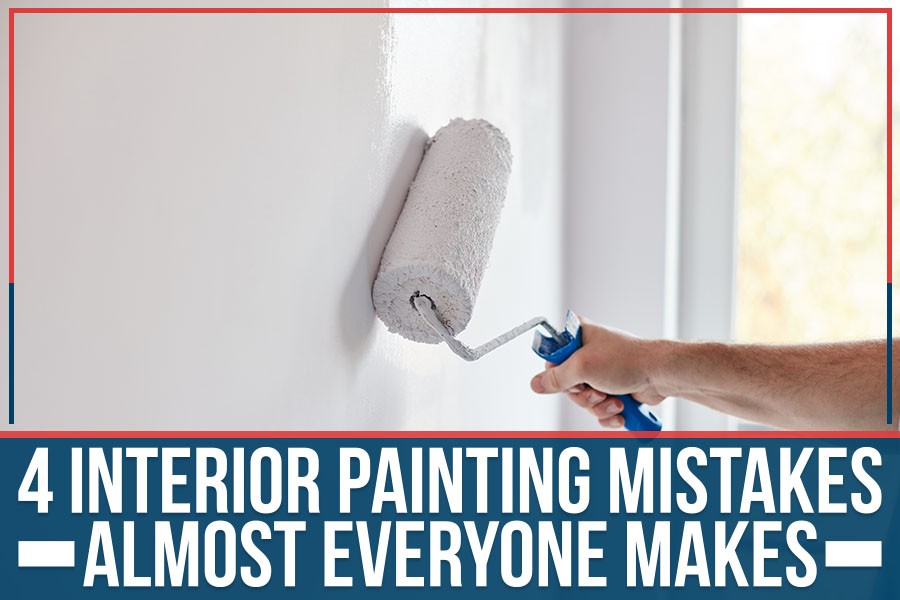4 Interior Painting Mistakes Almost Everyone Makes
Reliable Wall Painters: Dependable Experts for Your Interior Walls

Table of Contents
Wall painting is a popular home improvement project that can have a dramatic impact on the interior of a home. It can be completed safely and correctly with the help of professional wall painters, who are experienced in properly applying paint to both new and existing walls. Professional wall painters also offer the benefit of choosing from an array of designs and colors to enhance any room, as well as providing advice on which type of paint will best suit the job. This article will discuss some of the benefits associated with hiring reliable wall painters, provide tips for finding the right painter, suggest methods for preparing your walls for painting, explain different types of paint to consider when undertaking this project, and offer safety tips for DIY painting projects.
Professional wall painters provide a range of benefits to those seeking to improve the interior aesthetics of their home. Not only do these professionals possess the skill and knowledge required for an effective job, but they also have access to high-quality materials that may not be available to the general public. Furthermore, professional wall painters are able to complete jobs in a timely manner while ensuring quality control throughout the process. Additionally, experienced wall painters can help clients choose the most suitable type of paint and finishes for their particular project.
The cost savings associated with hiring a professional wall painter should also be taken into consideration. Instead of attempting a project on their own, homeowners can save time and money by leaving it in the hands of an expert. Professional wall painters often offer discounts and warranties that cannot be found elsewhere; this provides added assurance that customers will get what they pay for without sacrificing on quality or longevity.
Finding the right painter for your interior walls can be a challenge. It is important to thoroughly check references and reviews, get an estimate of the job, and ask for photos of previous work. Doing so will help ensure that you have chosen a dependable expert who will do the job efficiently and to your satisfaction.
Verifying customer reviews and references is essential in selecting reliable wall painters. When interviewing potential contractors, ask for at least three customer references from their most recent projects. Contact the references and ask them if they were satisfied with the quality of work and the professionalism of the contractor. It is also important to check online reviews to get an idea of how previous customers felt about working with them. If a contractor has a high percentage of positive reviews, it may be an indication that they are reliable and do good work. Additionally, inquire about any professional certifications or affiliations that the painter may have. This can help ensure that you hire someone who has specialized training in painting walls properly and safely.
Obtaining an estimate from potential contractors is a crucial step in the process of selecting wall painters. Estimates should include how much the job will cost, the materials to be used, and any additional services such as wallpaper removal or caulking. It is important to ask questions about any costs that are not included in the estimate and ensure all details of the project are clearly outlined so there are no surprises later on. Additionally, it is important to compare estimates between various contractors in order to choose one that best meets your needs while staying within budget.
When getting an estimate for wall painting services, homeowners should also consider other factors beyond just cost. These may include the experience level of the contractor and their team, how quickly they can complete the job, and if they provide a warranty for their workmanship. All these items should be considered before making a final decision on which contractor to hire for your wall painting project.
Requesting photos of previously completed projects is an important step when selecting wall painting contractors. It allows potential customers to evaluate the quality of work done by the contractor and to assess whether their expectations will be met. Photos of previous projects should include a variety of work, such as different types of surfaces (e.g., wood, brick, concrete), different textures (e.g., smooth, textured), and different colors. Additionally, asking for references from former clients can provide insight into the contractor's level of professionalism and reliability in completing jobs on time and within budget. Finally, it is beneficial to confirm that the company has appropriate liability insurance in case there are any issues with their workmanship or materials used during a project. All these steps are essential in ensuring that reliable wall painters are hired for interior walls.
Before beginning any painting project, it is important to properly prepare the walls. This includes repairing any cracks or holes, cleaning the wall surface and choosing the right primer for the job. Doing so will not only ensure a better-looking paint job but also help protect your wall surface for years to come.
Repairing cracks and holes in interior walls requires specialized techniques to ensure the best possible results. When repairing a crack or hole, it is important that proper tools and materials are used to prevent further damage. The most common tools for this type of repair include spackling paste, putty knives, sandpaper, and a damp cloth. After the area has been cleaned, spackling paste should be applied to fill in any gaps or cracks. Once the paste has dried, it can then be sanded down until there is an even finish on the wall. Finally, a damp cloth should be used to remove any dust or debris from the area before painting begins. Proper preparation of walls prior to painting will help create a professional finished look for any interior space.
Prior to painting, careful cleaning of the surfaces is essential to ensure a professional finish. It is important that all dust and dirt be removed from the walls so that it does not affect the quality of paint application. Wall painters use a combination of techniques such as using soft cloths or sponges with mild detergent solutions, vacuuming, and sanding to achieve this end. Additionally, they may also use specialized cleaning agents for stubborn stains or blemishes on the wall surface. By taking these steps, any traces of oils or debris can be eliminated prior to painting which will result in a smoother and more even coating of paint when applied. Furthermore, if done correctly by one of the reliable wall painters available today, it can help extend the life of your painted walls by preventing premature deterioration caused by dirt buildup or contamination during painting.
Selecting the right primer is essential to ensuring a successful paint job. Primer adheres to the wall and assists in creating a longer-lasting, more durable finish. It also helps promote better adherence of the paint to the wall surface, increasing durability and providing smoother finishes. In addition, primer can help reduce any flaws that may be present on a wall's surface including small cracks or pits which can interfere with proper painting techniques. It's important to choose a suitable primer for each type of wall material such as plaster, drywall, wood, stucco or concrete as these materials require different types of primers with varying levels of porosity and moisture resistance. A reliable painter will understand how important it is to select the right primer and will take into consideration factors like previous treatments applied to a wall or existing humidity levels before making their selection. Ultimately, selecting an appropriate primer will provide you with better results when it comes time for painting your walls!
Considering the type of paint to use for interior walls is an important factor in achieving a desired result. There are several types of paint available on the market that can be applied to interior walls, each with their own unique benefits and drawbacks. Latex-based paints are popular choices as they offer good coverage, have low odor during application, and dry quickly. Oil-based paints provide better adhesion than latex-based paints, but may take longer to dry and have a stronger odor when being applied. Acrylic paints offer superior resistance to fading and discoloration, making them great for high traffic areas or rooms with a lot of natural light. Additionally, certain specialty or designer finishes such as satin or eggshell can also be used to add texture and depth to any interior wall project. Ultimately, selecting the right type of paint depends on your budget constraints as well as your specific needs for your project.
When it comes to painting projects, safety should always be the primary concern. Although hiring reliable wall painters can help eliminate many of the potential risks associated with DIY painting projects, there are still a few important safety tips that all do-it-yourselfers should keep in mind. The following paragraphs will discuss some of these precautions in more detail.
First and foremost, it is essential to understand the hazards of any chemicals used in the process. Many paints contain volatile organic compounds (VOCs) as well as lead and other toxins which can be extremely dangerous if inhaled or ingested. As such, it is recommended to wear protective gear such as gloves, goggles, and a respirator when handling paints and related products. Additionally, proper ventilation should also be provided to ensure adequate air circulation during painting activities.
Furthermore, if working with ladders or scaffolding for higher surfaces, it is important to take extra caution and make sure they are properly set up before beginning any work on them. It is also recommended to have someone else around who can provide assistance if needed when using ladders or scaffolding since falls from heights remain a leading cause of injury among home improvement workers. Finally, proper clean up procedures should always be followed after completing a project to properly dispose of any remaining paint or debris from the workspace safely and securely.
Painting the interior walls of your home can seem like a challenging endeavor, but when approached with expertise, it has the power to significantly enhance the ambiance of any room. Professional wall painters are reliable experts who possess a deep understanding of paint selection for different environments, proper wall preparation techniques, and essential safety measures for DIY projects. Armed with these invaluable tips, homeowners can confidently choose the right painter and select the appropriate paint, thereby achieving a stunning transformation that turns their house into a warm and inviting haven. By mastering the art of executing painting projects, you ensure a successful job and a breathtaking end result.
Author

Mason Marquis, raised in Newport Beach, California, and Austin, Texas, amalgamated his experiences from both vibrant cities in his journey. His academic pursuit in Economics and Psychology at the University of North Texas (UNT) led to the founding of Spray Tex Painting. This venture was not just a business for Mason but a practical application of his academic learnings, particularly the integration of economic concepts and psychological understanding. Spray Tex Painting, under Mason's direction, transcends being merely a painting service; it's a platform where client visions are realized through dedication and creativity.
Related Articles

4 Interior Painting Mistakes Almost Everyone Makes

4 Tips For Upgrading The Paint At Your Food Joint

5 Unique Texture Painting Ideas to Add Depth to Your Walls

A Comprehensive Approach: Unveiling the Whole-house Paint Services